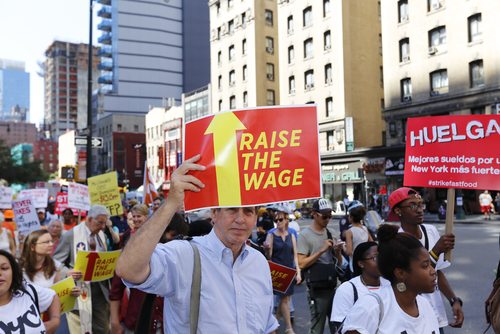
a katz / Shutterstock.com
December 31, 2014; National Employment Law Project
A minimum wage of $8 or $9 an hour is hardly going to lift a family out of poverty, but boosting the minimum wage in some states to that level—above the $7.25 mandated as a wage floor by federal law—may mean a little less financial stress for the working poor. The nonprofit National Employment Law Project has produced a list of all of the states that will have minimum wage requirements higher than the federal requirement sometime in calendar year 2015:
|
Alaska |
$8.75 |
|
Arizona |
$8.05 |
|
Arkansas |
$7.50 |
|
California |
$9.00 |
|
Colorado |
$8.23 |
|
Connecticut |
$9.15 |
|
Delaware |
$8.25 |
|
Florida |
$8.05 |
|
Hawaii |
$7.75 |
|
Illinois |
$8.25 |
|
Maine |
$7.50 |
|
Maryland |
$8.25 |
|
Massachusetts |
$9.00 |
|
Michigan |
$8.15 |
|
Minnesota Sign up for our free newslettersSubscribe to NPQ's newsletters to have our top stories delivered directly to your inbox. By signing up, you agree to our privacy policy and terms of use, and to receive messages from NPQ and our partners. |
$9.00 |
|
Missouri |
$7.65 |
|
Montana |
$8.05 |
|
Nebraska |
$8.00 |
|
Nevada |
$8.25 |
|
New Jersey |
$8.38 |
|
New Mexico |
$7.50 |
|
New York |
$9.00 |
|
Ohio |
$8.10 |
|
Oregon |
$9.25 |
|
Rhode Island |
$9.00 |
|
South Dakota |
$8.50 |
|
Vermont |
$9.15 |
|
Washington |
$9.47 |
|
West Virginia |
$8.00 |
|
District of Columbia |
$10.50 |
In addition to these 29 states plus the District of Columbia, a number of cities are also raising their minimum wages in 2015, including San Francisco ($11.05), Seattle ($11.00), San Jose ($10.30), SeaTac ($15.24), and Chicago ($10.00, to rise to $13.00 in December).
Nonprofits like NELP have been doing the necessary research to show that raising the minimum wage to $8, $9, or $10 an hour will not cause the massive job losses that opponents suggest. But the campaigns to win minimum wage increases in states and localities are the responsibility of community-based nonprofits that know their local economies and politicians. Not one of these new minimum wage rates would have occurred had it not been for persistent nonprofit advocacy. That’s what it will take to make progress in the other 21 states and in municipalities across the nation.—Rick Cohen












